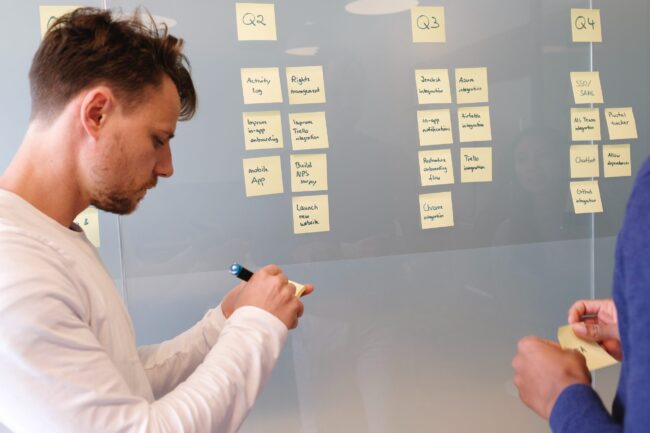What plans do you have for your business in the New Year? Is your HR strategy in complete alignment with your organisational objectives?
Along with your plans for other core business areas like marketing, sales and finance, your people plan plays a critical role in ensuring your company achieves its goals. But it’s not set in stone: it’s dynamic and must be regularly revised and adjusted to keep pace with changing circumstances.
It’s good practice to review your people plan quarterly, and this is something we do with all our retained clients.
Reviewing your HR needs is an exercise in reverse engineering, requiring you to work backwards from your goals to consider their impact on your people – then check you have the infrastructure, skills, and competencies in place to make them a reality.
In our experience, businesses tend to focus on the resources and roles they need to have in their people plan, giving rather less thought to how those resources and roles need supporting to be effective.
A good people plan will look ahead to consider capability and training needs and try to anticipate potential change – for people as well as the business. If for example, you know an employee is going to be taking maternity leave in a few months, your plan needs to factor this in, identifying how continuity will be maintained, and when any conversations need to take place.
So, how does your people plan measure up against the ambitions you have for your business? Here are six questions to ask yourself:
1. DO YOUR EMPLOYEES HAVE THE RIGHT MANAGEMENT SKILLS?
Does your plan take account of all the skills your people need, highlight where there may be skill shortages, and identify how these will be addressed?
Too often, people are put into line management roles and expected to succeed because they’ve demonstrated they are technically competent. But this doesn’t mean they have the management skills their role calls for. Regardless of where an employee may be in the management line, do they have what it takes to engage, motivate and inspire loyalty in those people who report into them?
Do your people have the skills they need to deal with change? Businesses that invest in training managers and equipping them with the skills they need to manage, motivate and support people and teams are best placed to deal with change.
Inevitably, there will be times when you have no option but to be flexible, react and adapt, but this said, it’s vital to make sure you have a solid infrastructure in place for training people so that when change hits, those people impacted know what to do. Ideally, you will have anticipated and rehearsed potential scenarios, so plans have been experienced and tested.
2. ARE YOUR EMPLOYEES FULLY ENGAGED WITH YOUR BUSINESS?
To make the most of the skills, talent, knowledge and experience in your employees, you need to ensure that each of them is fully engaged with your business.
Ideally, at all levels in your organisation, you should be striving to foster an environment that encourages employees to invest fully in their role, so that for example, they’re prepared to dedicate discretionary time to consider ways systems and processes might be improved.
Building engagement requires looking at the ways you are connecting with your team – and the ways they are connecting with each other. But it isn’t only about communication, it’s also about emotional intelligence, and you’ll need to make sure you’re doing everything you can to nurture this skill within your people. For example, you might have equipped a line manager with all the technical skills required to undertake an appraisal, but do they have the emotional intelligence to have a heartfelt conversation with their colleague? A conversation that will be deep enough for them to fully understand the whole person at work – while keeping within boundaries?
3. DOES YOUR PLAN TAKE ACCOUNT OF YOUR EMPLOYEE’S FUTURE NEEDS?
As much as it possibly can, your plan needs to anticipate the future needs of your employees.
Using all the information available to you, you need to consider each individual within your organisation. What support do you need to put in place to help them be the best they can be? Are there any personal circumstances or life events you need to factor into your plan?
Assessing future needs to ensure your organisation gets the best return on investment in its people – and that employees get the best from the organisation – may involve having difficult conversations. But it’s crucial employees feel they can be open and honest, and confident you’ll listen to their needs as the business develops and grows.
4. ARE YOU LOOKING AFTER THE WELLBEING OF YOUR PEOPLE?
Is employee wellbeing embedded into your organisational culture?
In recent years, there’s been a growing focus on wellbeing in business. Often though, when it’s talked about, it’s in the context of employers going ‘above and beyond’. But it needs to become the norm. The pandemic threw the topic into sharp relief, and unsurprisingly, those employers who already proactively embraced the concept are those that have fared best.
Your employees are your most valuable resource, and taking care of them requires an approach that’s very different to the way you maintain and look after any of your other assets. Your business needs to invest in helping employees to stretch and develop themselves on a personal level, and to take care of their mental and physical health,
5. ARE YOU USING THE RIGHT CRITERIA TO JUDGE PERFORMANCE?
Are you rewarding the right people in your organisation?
Setting targets is key to achieving business objectives, but if you operate one-dimensional incentive schemes that only trigger a reward when a ‘magic’ number is hit – you may not be leveraging the full potential of your people. This kind of culture can lead to extreme swings in performance, and the focus on targets can distract attention from other vital areas and suppress creative thinking.
An ideal solution will identify and reward people who – though they may not always reach every target they’re set, nevertheless contribute to steady, constant and sustainable growth or improvement.
The concept that momentum is as important as achievement is best explained by business guru Simon Sinek in this video How Do You Measure Success?.
6. ARE YOUR HR POLICIES UP TO THE JOB?
Do you have clear HR policies to help guide you through any eventuality?
Taking the time to set down policies and keep them up to date is essential: by having them in place, everyone in your organisation will know where they stand, and they’ll provide a point of reference if clarity is required.
It’s easy to see creating HR policies as more burdensome admin, but not having them when they’re needed can prove disruptive and costly. It’s worth noting that those businesses with unambiguous homeworking policies found it easy to implement new ways of working during the lockdown.
If you don’t have HR policies across all your core people areas, you’re leaving rules and boundaries open to interpretation. Of course, when you come to apply rules, you can use discretion, but not having any to apply will leave you exposed.
Remember, you don’t have to invest your own time in creating HR policies – you can always engage an expert like Organic P&O Solutions to do it for you!
Let Organic P&O Solutions Review Your People Plan!
Tell us about your goals, about the opportunities and challenges your business is facing, and we’ll review your people plan to make sure you’ve got everything covered. Contact us today for an initial chat!

